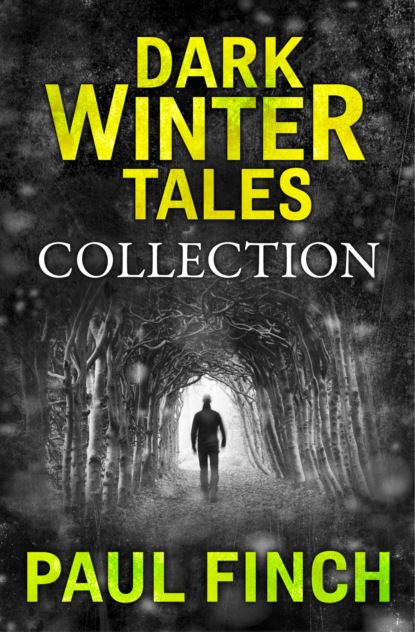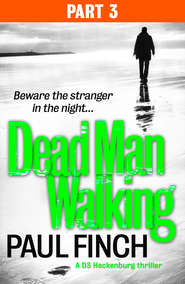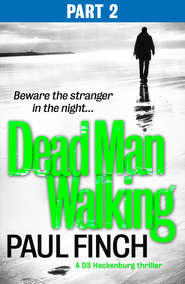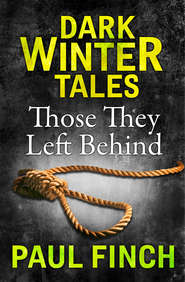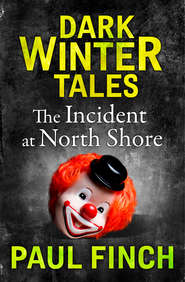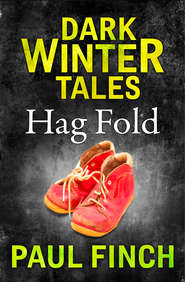По всем вопросам обращайтесь на: info@litportal.ru
(©) 2003-2025.
✖
Dark Winter Tales: a collection of horror short stories
Автор
Год написания книги
2019
Настройки чтения
Размер шрифта
Высота строк
Поля
She tottered outside, still whimpering, still weeping, beating down on herself, imagining that she too had caught alight. Only by a miracle, it seemed, had she avoided this, but still she wasn’t safe – she expected a fiery figure to come surging out. But if McKellan tried to do that, he failed, perhaps stumbling against the inside of the door, which now banged closed, entrapping what looked like a raging inferno inside the small outbuilding. Its grimy windows quickly blackened and shattered. Its wood and tarpaper exterior was already smouldering, flames licking out through every crevice.
Sharon continued to back away, not quite believing that her ordeal was over. As the fire spread over the hut’s exterior, it burned so fiercely that the heat of it dried her tears, seared her sweat-sodden cheeks. And then a hand landed on her shoulder.
She squealed as she spun around – only to see the brutish, baffled features of Mike Lewton, with Rob Ellis standing a few feet to one side. Their patrol vehicle was parked behind them. Lewton still held the bolt croppers with which he’d managed to secure access through the front gates, but he almost dropped them with shock when he saw the state Sharon was in: her hair a tangled mop of gluey blood, her face equally stained but also dirty, wild-eyed.
“He’s … he’s in there,” she stammered shrilly, gesturing at the hut.
“What? Who is, Shaz?”
She shook her head dumbly, unable to say more.
The men pushed past her towards the blazing structure. Much of the hut’s combustible material had been consumed, and the small building was now in the process of collapsing on itself. Flames still blazed at ground-level, but otherwise only a bare, blistered framework remained. Sharon stood numbed while her two colleagues tried to get closer, wafting at the pungent smoke. Ellis gave a sharp cry. “Christ! There is someone here!”
“I … I lit him up,” Sharon said, suddenly giggling.
Lewton stole an astounded glance at her.
“There’s two of them!” Ellis blurted. “Bloody hell!”
The fumes had turned foul with the stench of charred meat, but the flames continued to recede and Sharon could distinguish two blackened shapes lying in the glowing wreckage. Lewton swung back to her, face pale. “Shaz … what have you done?”
She shook her head, still giggling. “Not the winos … they were already dead.”
“You say you lit this fire? Why?”
“He was in there. He murdered them.”
“Who?”
“He killed Sergeant Pugh as well.”
“Who killed Sergeant Pugh?”
Lewton’s expression was so earnest, so honestly mortified by what he was seeing here, that Sharon now thought it better to stop sounding so amused and actually try to assist. “Blair McKellan, obviously.”
“Shaz …” Lewton shook his head. “Blair McKellan was arrested forty minutes ago. His boat ran aground near the pier.”
“Mike!” Ellis shouted.
Lewton darted back to his side. Sharon ventured over there as well, vaguely amazed by that last piece of news, though not necessarily mystified. The object of their interest seemed to be a square aperture in the middle of the hut’s scorched floor. A steel grille lay to one side of it. That made sense too, now that she thought about it.
“If there was someone else in here, that’s how he got out,” Ellis said.
Lewton kicked a heap of embers aside and crouched to get a better look. “Shit,” he breathed. “There’re hundreds of channels and culverts down there.”
“And they all lead to the sea,” Sharon said. “But that’s just about right.” The two men gazed at her blankly, at which point she began giggling again, her giggles soon transmuting to full-blown laughter. “He’s so, so angry.”
“Who’s angry?” Lewton asked. “Who the hell are you talking about?”
She made a big effort to control herself. “Who do you think? … Bubbles.”
Children Don’t Play Here Anymore
Paul Finch
Contents
Cover (#u5a9ffc38-6c04-5ff1-b48a-cf1faf1983d1)
Title Page (#u1976c52b-3cf5-5529-a422-03b1cd2b4d0e)
Children Don’t Play Here Anymore (#u7f3290d7-85b7-5aee-b465-869c1b80ad34)
Geoff slows his Chrysler to a halt on the road called Woodcock Close.
It is a cul-de-sac, as its name suggests, with a turning circle at the end and detached middle-class houses at regular intervals along its western side. Opposite these, on the east, the ground flows away downhill, a rough uncultivated pasture of brambles, ragwort and rich, thick meadow-grass. At the bottom, perhaps two hundred yards down from Woodcock Close, a dense stand of trees encloses a woodland pond. Beyond this there is a fenced-off paddock, which is periodically used for exercising dressage horses, though the stately residence to which it belongs lies half a mile to the north, only accessible from the paddock by a winding, unmade lane, and when you reach it, well concealed within a manicured spinney of sculpted evergreens; out of sight, out of mind – and thus unattached to the green and pleasant area which lies below Woodcock Close, tucked away like a secret garden.
While dreary enough in the winter – unless there is snow, in which case it becomes an exceptional sled and toboggan run – this small but hidden valley is a magical place at every other time of the year. It is no more than ten or twelve acres in total size, yet, in appearance at least, it is deep, secluded, mysterious – even though in reality it sits in the heart of the town’s sprawling suburbs, and is perhaps only five minutes’ walk from the ever-rumbling M6 motorway. Locals like us have always known it as ‘the Dell’, and probably every generation of our boys, going back to the pre-war years, waged their own battles down in its leafy heart, explored their own jungles, fought their own dinosaurs, built their own treehouses and swung on their own makeshift rope swings.
But that was then and this is now. And children don’t play in the Dell anymore.
“You know, Dad,” Geoff says as he parks, “… you don’t have to do this.”
“I know,” I reply.
“It’s not as if you’ve got anything to prove.”
I consider his words, which I hear every time we come here, and then take my stick from the footwell.
“You really expect to find something?” he asks. “After so long?”
I throw him a look – one of those short, shrewish looks I increasingly throw at people these days, and which I’ve recently made a mental note to try and clamp down on. “It … it isn’t that. You know it isn’t that.”
“I know.” His voice softens. He smiles sympathetically. “It’s become an annual pilgrimage, this, hasn’t it?”
“Something like that.” I button up my overcoat and climb from the car.
It is a cool day in early September. It would probably be warm if not for the gentle easterly breeze, which rustles like paper in the grass atop the Dell. The sun is mellow and misted in a pebble-blue sky, against which the foliage of the woodland below is bright emerald in colour, deep, succulent in texture.
“I wish you wouldn’t do it, though.” Geoff climbs out of the car on the other side. He nods at my stick and at my slight grimace of pain as I straighten my ever-creaking back. “I mean … you’re not going to be able to get up and down that hill much longer. Not at your age.”
I’m not sure whether this is an intended wind-up.
“I’m only sixty-seven, you know,” I remind him.
He doesn’t smile (which means that it isn’t a wind-up at all). “You’re a sixty-seven-year-old with chronic sciatica.”
“Well you’ll be around to help me, won’t you? If things get tough.” I use that terse, fatherly tone, which always suggests that you’re telling your son something rather than asking him.





